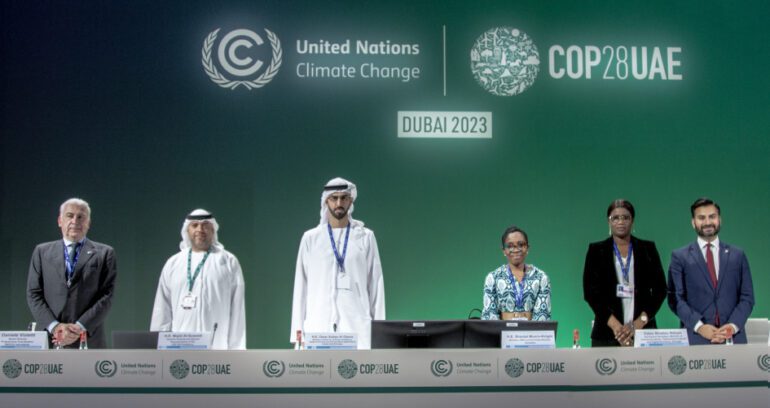TL;DR:
- COP28 introduces the AI Innovation Grand Challenge for climate action in developing countries.
- The initiative is a collaboration between the UN Climate Change Technology Executive Committee (TEC) and Enterprise Neurosystem.
- AI is recognized as a valuable tool in combating climate change.
- Key figures, including UN Climate Change Executive Secretary Simon Stiell and H.E. Omar Sultan Al Olama, emphasize the importance of integrating AI into national policies.
- AI is already being used for climate prediction, crop improvement, water conservation, and renewable energy optimization.
- COP28 highlights the potential of AI to drive transformational climate action while addressing digital inequality.
- Collaboration with tech companies, machine learning, and AI applications is essential in climate adaptation.
- Efforts should bridge the digital divide and incorporate local languages in AI solutions.
- The United States is committed to responsibly harnessing AI to mitigate climate change.
- The initiative focuses on least developed countries and small island developing states.
- UN Secretary-General António Guterres calls for reliable and safe AI to supercharge climate action.
- The #AI4ClimateAction Initiative seeks to advance climate-resilient and low-emission development.
- New collaborations and partnerships are encouraged for concrete policy and implementation results.
Main AI News:
The UN Climate Change Technology Executive Committee (TEC), in collaboration with Enterprise Neurosystem, a non-profit open-source AI community, has unveiled a groundbreaking initiative during COP28. The AI Innovation Grand Challenge aims to unearth and support AI-powered solutions for climate action in developing countries.
This momentous launch took place as part of a high-level event at COP28, organized by the UN Climate Change Technology Mechanism in partnership with the COP28 Presidency. The significance of this endeavor is underscored by the growing acknowledgment of AI’s potential in addressing climate change.
Simon Stiell, UN Climate Change Executive Secretary, remarked, “We are seeing increasing evidence that artificial intelligence can prove an invaluable instrument in tackling climate change. While we remain mindful of the associated challenges and risks of AI, the Innovation Grand Challenge is a promising step forward in harnessing the power of artificial intelligence and empowering innovators in developing countries.”
H.E. Omar Sultan Al Olama, Minister of State for Artificial Intelligence, Digital Economy, and Remote Work Applications of the United Arab Emirates, emphasized the need to integrate AI into national policies and plans. He stated, “Harnessing artificial intelligence as a strategic asset to mitigate climate change involves integrating it into national policies and plans. This integration facilitates the use of data analytics to align policy with real-time climate data, thereby enhancing its efficacy and advancing technological development and scientific discovery in the field of energy. These measures and policies should not be viewed in isolation, but rather as a unified global initiative, acknowledging that climate change transcends geographical boundaries and requires concerted global efforts.“
AI is already demonstrating its potential in predicting climate patterns, optimizing crop yields, conserving water, and enhancing renewable energy systems. The COP28 event gathered leaders from governments, the United Nations, development cooperation agencies, and businesses to explore how AI can drive transformative climate action in developing nations while addressing concerns about digital inequality.
Shantal Munro-Knight, Minister in the Prime Minister’s Office of Barbados, highlighted their collaboration with international tech companies to test innovative ideas. These initiatives include employing machine learning and AI to detect tropical diseases, design hurricane-resistant buildings, and plan infrastructure investments. She stressed the importance of collaboration, training, and technology transfer in ensuring AI’s effective contribution to climate mitigation and adaptation for small island developing states.
Moussa Bocar Thiam, Minister of Communications, Telecommunications, and the Digital Economy of Senegal, emphasized the need to bridge the digital divide, especially among vulnerable populations affected by climate change. He proposed integrating chatbot voices with local languages in emerging technology tools as one solution to address this disparity.
Mr. Ali Zaidi, Assistant to the President and National Climate Advisor of the United States of America, affirmed their commitment to managing AI’s risks and leveraging its promise. He referred to President Biden’s recent Executive Order on AI as evidence of this commitment. By working collaboratively, the United States aims to harness emerging AI technology responsibly to mitigate climate change, promote sustainability, resilience, and create an equitable clean energy future.
The event aligns with the Technology Mechanism Initiative on Artificial Intelligence for Climate Action (#AI4ClimateAction), which examines AI’s potential to scale up climate solutions in developing countries, particularly least developed countries and small island developing states.
In line with UN Secretary-General António Guterres’ call to develop reliable and safe AI to supercharge climate action and achieve the Sustainable Development Goals, the #AI4ClimateAction Initiative seeks to advance climate-resilient and low-emission development.
Stig Svenningsen and Erwin Rose, Chairs of the Technology Mechanism, emphasized the need for new collaborations and partnerships to yield concrete results in policy and implementation under the #AI4ClimateAction Initiative.
Conclusion:
The launch of the AI Innovation Grand Challenge underscores the growing recognition of AI’s role in addressing climate change. This initiative opens doors for businesses and innovators to contribute to climate solutions in developing countries. As AI applications continue to expand in climate-related sectors, there is a significant market opportunity for companies specializing in AI-driven climate technology and solutions. These developments also highlight the importance of responsible AI integration, collaboration, and technology transfer in ensuring equitable climate action.

